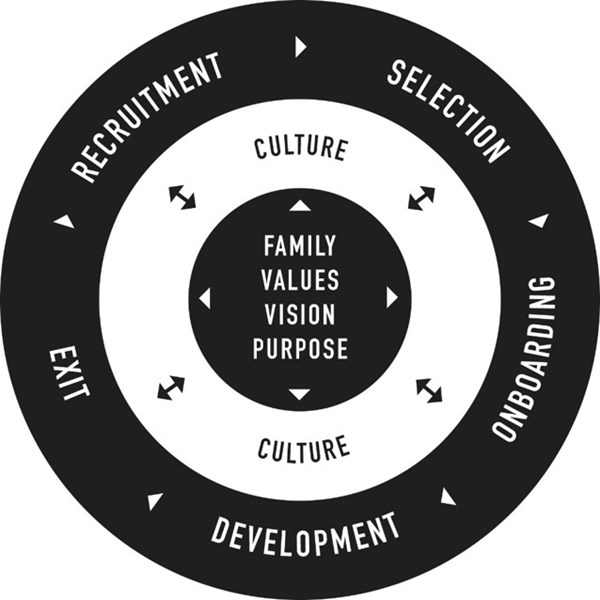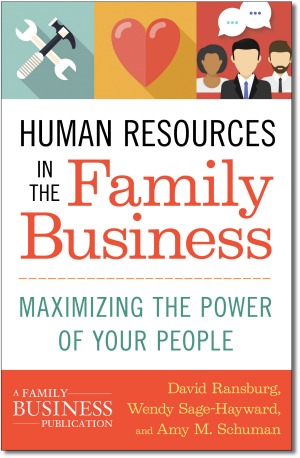What Is the Complexity of Manging Family Resources
People matter, so Human Resource Direction matters. This is certainly truthful in all businesses, but 60 minutes is even more of import in family unit firms for the following reasons:
- Family businesses often treat employees – whether family or nonfamily – equally family, thus putting more than attention and pressure on the need to handle HR bug with great care and respect.
- Family dynamics complicate the emotional environment of a family business.
- Family relationships and the family's reputation are at stake.
- The livelihoods and fortunes of concern families are ofttimes tied upwards in the enterprises they run, so they demand to maximize the value of the business.
Because of these factors and the multi-layered relationships in family unit firms, the HR office has even more than potential to contribute to the vitality of both the business and family.
Recent research indicates that businesses with an actively engaged workforce written report 2.6 times the growth in earnings per share than counterparts with disengaged employees.[i] In fact, over 30 studies have correlated employee appointment to variables including improve sales, profits, productivity and customer service, forth with decreases in turnover, absence, product defects and safety incidents.[ii] While HR might seem like a relatively "easy" business organisation function, creating thoughtful systems that maximize engagement, productivity and satisfaction is far from unproblematic, and requires a strategic approach to both the crafting of HR practices and their implementation.
Understanding 60 minutes
The conventional definition of HR is the variety of activities required to manage employees and employee-related policies and practices in a business. We prefer a broader view of Hr that includes all activities related to the HR "life wheel" within a company, along with the values-based cultural features that inform every phase of that life wheel. The five components are briefly described below:
- Recruiting: Recruiting is about where to find the correct people to hire. We believe it is more effective and efficient to do significant upfront thinking past asking key questions near what is all-time for the business concern and family unit – then using the answers and themes that emerge to identify potential candidates from within and exterior the family unit.
- Option: Selection is the natural pace after recruiting, which involves choosing the all-time candidates to rent from the small-scale pool of candidates you have considered more seriously. While many family businesses approach selection in a casual, informal fashion, we recommend a systematic approach to selection.
- Onboarding: Onboarding is the specific manner in which you bring new hires into the firm. More narrowly known as "orientation," onboarding is better conceived as an important course of integration, a continuing plan and process that helps assimilate employees seamlessly into the firm. The optimal arroyo to onboarding takes a long-term view of the procedure every bit unfolding over months rather than days, and is congenital on the thought that the arrival of new employees means a two-mode merger, creating value for both the business, the new hires and the family.
- Development: Development is the ways past which y'all grow the capabilities of your people, aligned with the strategy, vision, culture and needs of the firm. As we see it, an ideal evolution system reflects a continuous procedure of learning and growth. The procedure of development includes sensitively managing the review and development of family and nonfamily employees with a focus on continually improving the business'south ability to develop its people.
- Leave: We believe that regardless if the exit is voluntary or involuntary, and whether the private is likely to return to the business organization in the future or not, information technology is important to develop a process that helps employees depart from the company in the most mutually beneficial way. In addition, an constructive leave process helps prevent the exit of a family fellow member from the business organisation from condign an exit from the family unit.
Who is Responsible for HR Direction?
The HR office is not merely the responsibleness of the HR department. Every manager should be aware of their part in nurturing potent, performance-based and values-based corporate cultures. This is piece of cake to perceive in early-phase businesses, which are unremarkably too small to justify a standalone HR department. However, even if your business concern has moved out of the entrepreneurial stage and employs dedicated Hr resources, you can go along the entrepreneurial flame alive by continuing to involve front line management in key Hour processes.
Hr can and should exist a strategic partner inside the business firm, rather than just a transaction-focused authoritative function. Despite the potential value of HR, too many firms fail to use this function strategically, relegating it to an administrative and/or policing "personnel" role, with a focus on the basics and bolts of the employee experience or the perfunctory enforcement of routine policies. As such, Hour becomes more than like a metaphorical finger-wagging librarian than a trusted, value-generating partner. These firms are missing out on potentially larger opportunities for creating value on multiple dimensions – or at the very least for involving HR when dealing with circuitous employee-related and cultural issues.
In that location is mounting testify for the strategic value of 60 minutes – both the people and the systems/processes involved. I piece is the rise of the chief human resources officer or CHRO. A recent Harvard Business organization Review article notes that Hr leaders at many firms now written report directly to the CEO (rather than the COO or CFO) and serve as key advisers to the meridian executive and board, requiring higher-level leadership and strategy skills.[three]
HR and Family unit Business concern Essential Ingredients
Because your business'due south performance is and then highly dependent on your people, HR is a crucial contributor to the superior performance of family unit firms. So, maximizing the effectiveness of your Hour systems and practices will aid maximize your operation beyond the board. Nosotros believe strongly that Hr tin can be an enabler rather than a disabler, a builder rather than a blockade, a partner rather than a peripheral player. In brusk, the ideal function for Hr is as a true champion of engagement of all business firm resources, not but the human ones. In many firms, that will hateful taking clear, practical steps to transition HR into a more strategic office.
If your concern's ownership and senior management already view HR as a strategic partner, then y'all are well on your way. If not, and so you will accept to demonstrate the strategic value that the HR function tin can provide. In our experience, that sit-in begins with taking a holistic and strategic view of the Hour function inside the broader business – take the initiative to sympathise the broader business, not only your functional area. If you lot proactively work with other functional areas to understand their goals and challenges, and so offer advisable HR-driven solutions that assistance each role and the business as a whole, you will ultimately be seen as a strategic partner by many others.
Family unit firms face up an added complication regarding human resource direction. In dissimilarity to nonfamily firms, family unit businesses take many overlapping dimensions and layers of complexity to navigate due to the integration of family unit, business and ownership systems. Our experience dealing with circuitous Hour issues in a range of family businesses has resulted in a dynamic, multilayered model of 60 minutes in family firms, as depicted in the figure below:

Family unit values, vision and purpose are at the middle of our model which illustrates the crucial role these components play in establishing a foundational platform from which the business concern can operate. The family unit vision, purpose and values influence and shape all aspects of a business including the culture and the five components of the HR Cycle. The model is multidirectional and dynamic in its nature which means that each component is influenced by, and so in turn, influences the others. Culture, though not a specific phase or phase of the Hr life cycle, influences every stage of that cycle.
Finding "both/and" Approaches to the Business organization/Family Dilemma
When facing tough Hr-related decisions, many business organisation-owning families and family business executives experience they take to choose between family unit and business. Which should prevail? This question is often directly related to HR policies and practices. Generally, do Hr decisions tend to favor the concern or the family? For example, are hiring criteria relaxed when hiring family members, or are higher levels of qualification and feel made mandatory?
The family unit-or-business question is the wrong question to ask. Information technology is not an "either-or" simply a "both-and." Nosotros believe in finding approaches that are best for the business and the family. There is a growing school of thought on the power of paradox in family business. This approach sees the nigh successful family firms as having a well-developed capability to embrace paradox, turning each "either-or" into a "both-and," rather than fugitive the event and crafting suboptimal compromises.[iv] This "both-and" arroyo can be very useful for managing common family business paradoxes related to HR functions, including tradition and modify, merit-based and entitlement-based, and exclusive and inclusive. Past accepting paradoxes as special bug that cannot be "solved" just can be managed, many leaders find innovative approaches that value and tap the power of both elements of the paradox, often in mutually reinforcing ways.
By recognizing the inherent complexities of family business, managing the occasional paradoxes, and taking a more than strategic approach to HR issues, you will exist well-positioned to non only manage current bug but besides to effectively conceptualize future complexities. Doing so volition allow you lot to create long term value for your business and the family.
[i] Marcia Conner, "Now that People Finally Matter to Businesses, HR Is the Side by side Big Affair," Fast Company, 9/30/11.
[2] Every bit noted in Kevin Kruse, "Employee Engagement: The Wonder Drug in Client Satisfaction," Forbes, i/seven/14.
[iii] Ellie Filler and Dave Ulrich, "Why Chief Human Resources Officers Make Great CEOs," Harvard Business organisation Review, 12/14.
[iv] For much more on how to understand and handle paradox in family business, come across Amy Schuman, Stacy Stutz, and John Fifty. Ward, Family unit Business every bit Paradox (New York: Palgrave Macmillan, 2010).

More information about this topic tin can exist establish in Human Resource in the Family unit Business organisation: Maximizing the Power of Your People by David Ransburg, Wendy Sage-Hayward and Amy M. Schuman. Filled with case studies, frameworks and practical tools, this volume addresses how to successfully anticipate and manage people issues and opportunities in a family business.
240 pages, hardcover published past Palgrave Macmillan, 2015.
Source: https://www.thefbcg.com/resource/managing-the-complexity-of-human-resources-in-family-firms/
0 Response to "What Is the Complexity of Manging Family Resources"
Post a Comment